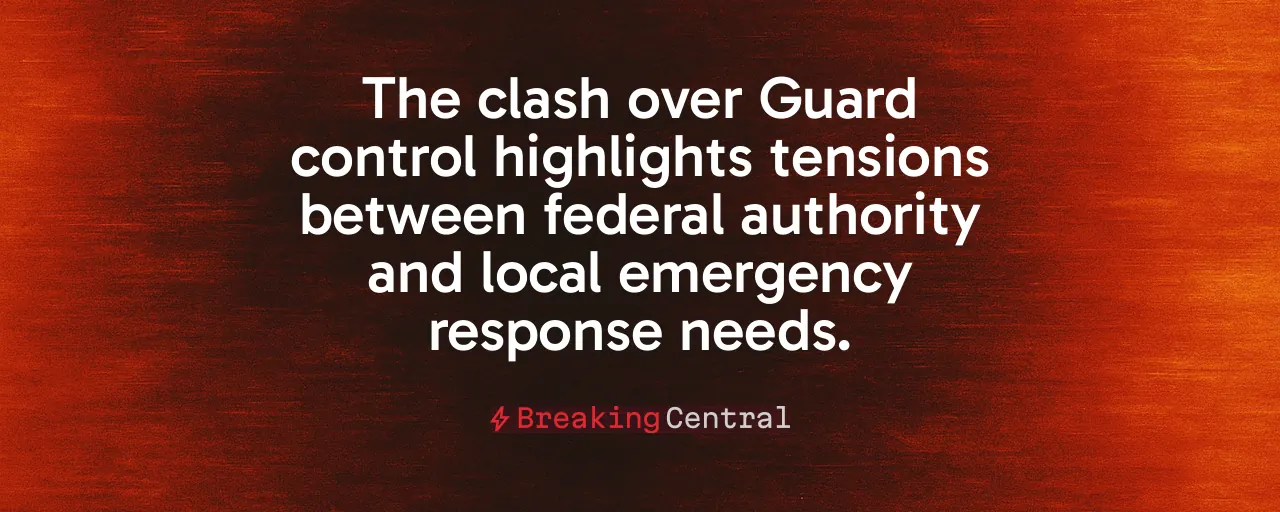A State Under Siege
California's wildfires are raging, and its National Guard is stretched thin. On June 30, 2025, reports surfaced that a top military commander urged Defense Secretary Pete Hegseth to return 200 troops from Los Angeles to firefighting duties. This plea echoes Governor Gavin Newsom's demands, as eight of 14 Task Force Rattlesnake crews remain diverted to urban protests. The deployment, ordered by President Donald Trump to quell unrest over immigration raids, has sparked a fierce dispute, pitting federal authority against state control.
The move to federalize 4,000 California National Guard members under Title 10 authority in early June 2025 was meant to protect federal facilities. Protests, some marked by arson and assaults, prompted the deployment of 700 active-duty Marines as well. However, with wildfire season intensifying and red flag warnings looming, the decision has left California's elite firefighting units at 40% capacity. Communities already scarred by years of devastating blazes now face heightened risks.
The dispute involves more than troop assignments; it concerns who ultimately makes decisions. The clash raises a fundamental question: does the president's power to federalize state forces outweigh California's right to manage its own resources? For those who value local control and practical governance, the answer leans heavily toward the state.
The Case for Federal Authority
Supporters of Trump's decision argue that the president holds clear authority under Title 10 to federalize Guard units when federal personnel or property face threats. Court rulings, including a Ninth Circuit pause on a district court's order to return the Guard to state control, have so far upheld this power. Protests involving violence against federal agents and ICE facilities, they contend, justify a strong response to restore order.
Historical precedent backs this view. In 1957, President Eisenhower federalized the Arkansas National Guard to enforce desegregation in Little Rock, overriding state resistance. Local police in Los Angeles also reportedly requested federal aid, signaling that the situation outstripped municipal resources. For those prioritizing law and order, the deployment is a necessary shield against chaos.
Beyond legality, a practical dimension exists. Federal agents tasked with immigration enforcement cannot operate safely under siege. A stable environment, supporters argue, protects federal operations and the rule of law itself. They point to reduced violence around ICE facilities since the troops arrived as evidence of success.
The Cost to California's Safety
However, the deployment's ripple effects are undeniable. Task Force Rattlesnake, a 300-strong unit trained to battle wildfires alongside CAL FIRE, is critically understaffed. With early-season fires already burning and projections of above-average activity through October, the loss of these specialized crews could prove catastrophic. Economic analyses estimate California's wildfire damages topped $40 billion over the past five years, a stark reminder of what's at stake.
The impact extends further. The Guard's fentanyl-interdiction team, vital for seizing drugs at the border, has seen a 32% staffing cut. Public safety, already a pressing concern, faces additional challenges. These trade-offs fuel arguments that federal overreach is undermining California's ability to protect its people.
California's response has been robust despite the constraints. Since 2020, the state has invested over $2.5 billion in wildfire prevention, expanded CAL FIRE's workforce by thousands, and added a second C-130 Hercules airtanker. These efforts, rooted in local initiative, highlight a state determined to safeguard its communities, even as federal decisions complicate the mission.
A Question of Sovereignty
At its core, this dispute is about power. The Insurrection Act grants presidents wide discretion to deploy troops domestically, but its use without a governor's consent is rare, last seen in the 1965 Watts riots. Legal scholars note that the Act's ambiguous language leaves room for interpretation, and pending appellate rulings may reshape the balance between federal and state authority.
For those who champion state sovereignty, the federalization feels like a power grab. California's National Guard exists to serve its citizens, rather than policing protests at the president's behest. The deployment's costs, from millions in logistics to weakened fire and drug responses, fall squarely on the state, while the benefits, if any, accrue to federal priorities.
This tension is not new. The debate over federal versus state control has simmered since the Founding, with states often serving as bulwarks against centralized overreach. Eisenhower's 1957 intervention, though justified by civil rights, set a precedent that conservatives today might view warily when applied to less clear-cut cases.
Restoring Balance
The path forward demands pragmatism. A tiered drawdown, as neutral analysts suggest, could keep a limited federal presence to protect key facilities while releasing Task Force Rattlesnake and drug-interdiction units back to state control. This compromise respects the need for order and California's urgent firefighting demands.
Congress can also act by clarifying the Insurrection Act's consultation requirements, ensuring governors have a voice in future federalizations. Bipartisan support for supplemental wildfire funding, already a proven strategy, would bolster CAL FIRE's efforts without relying on military resources.
The goal is to prioritize communities over politics. California's wildfires do not care about legal debates or federal agendas. They burn regardless. Returning the Guard to its core mission, protecting lives and land, aligns with the practical, local-first values that resonate with those who distrust distant bureaucracies.
This clash will likely set a precedent. If federal power prevails unchecked, other states could face similar encroachments. If California's sovereignty holds, it reaffirms the principle that states, not Washington, best understand their own needs. The stakes are high, and the outcome will echo far beyond the Golden State.
